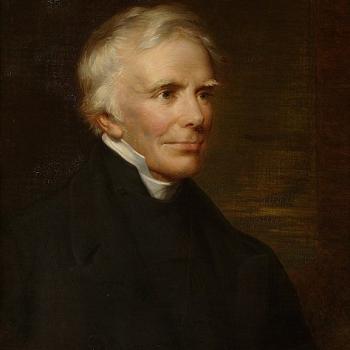I will be resolving all of the alleged “contradictions” from the web page entitled “194 CONTRADICTIONS, New Testament.” It’s perpetually striking to observe how many of these are obviously not logical contradictions, and how very easy they are to refute (many being patently and evidently absurd). A few here and there do seem to be genuinely perplexing (at first glance) and require at least some thought and study and serious examination (they save my patience). But all are ultimately able to be (in my humble opinion) decisively resolved. Readers can decide whether I succeed in my task or not, in any given case. My biblical citations are from RSV. The words from the web page above will be in blue.
See further installments:
Refutation of 194 Biblical “Contradictions” (#1-25) [4-5-22]
Refutation of 194 Biblical “Contradictions” (#26-50) [4-6-22]
Refutation of 194 Biblical “Contradictions” (#51-75) [4-7-22]
Refutation of 194 Biblical “Contradictions” (#76-100) [4-8-22]
Refutation of 194 Biblical “Contradictions” (#101-125) [4-8-22]
Refutation of 194 Biblical “Contradictions” (#126-150) [4-9-22]
Refutation of 194 Biblical “Contradictions” (#151-175) [4-11-22]
*****
176) Paul teaches not to steal. Eph.4:28.
Paul admits to stealing. 2 Cor.11:8.
Commentaries on the second passage:
The intensity of St. Paul’s feelings, smarting under base calumny and ingratitude, reveals itself by the passionate expression which he here uses. . . . It is meant rather ironically than literally. (Pulpit Commentary)
Paul thus strongly expresses the fact that he had accepted from other churches more than their share, that he might not draw on the Corinthians. (Vincent’s Word Studies)
In other words, he was being sarcastic and non-literal. Of course, Paul wouldn’t rob anyone. Again, our skeptic is eager to disgustingly besmirch Paul and anyone else in the all-important effort to attack the Bible. He has failed miserably in his task.
177) Paul was assured that he would not be hurt. Acts 18:9,10.
Paul was often physically abused. 2 Cor.11:23-27.
The Acts passage is about how Paul wouldn’t be harmed in Corinth only. God told him: “no man shall attack you to harm you; for I have many people in this city” (18:9). Is our skeptic unable to properly understand English sentences? This is a ridiculously clueless supposed “contradiction”: beyond and below the usual rock-bottom quality of this collection.
178) Paul states that the law is necessary. Rom.3:31.
Paul states that the law is not necessary. Rom.6:14.
I dealt with these general questions of the law in #41 and #151-154. No need to repeat myself.
179) Jesus said to go and baptize. Mt.28:19.
Paul said he was not sent to baptize. 1 Cor.1:17.
Division of labor. Paul’s specialty was evangelism and dealing with hard-nosed unbelievers. He could assign others to baptize new converts. It’s not difficult to do. No biggie and no contradiction.
180) Paul said he was not sent to baptize but to preach. 1 Cor.1:17.
Paul baptized. 1 Cor.1:16.
Patience, patience; almost done! This is the flip side of #179. As Paul indicated in 1 Corinthians 1:16, he baptized one household, as an exception to his rule, and couldn’t remember baptizing anyone else.
181) Jesus said that he did not come to abolish the law. Mt.5:17-19.
Paul said otherwise. Eph.2:15.
More questions about the law. See #41 and #151-154.
182) Jesus said that God did not condemn the world. Jn. 3:17.
Paul said that God did condemn the world. Rom.5:18.
Jesus did not talk in John 3:17. It was John or whoever wrote the Gospel bearing his name. Nor did he make this blanket statement. Rather, He said something more specific: “For God sent the Son into the world, not to condemn the world, but that the world might be saved through him.” It was specifically about why He sent Jesus.
Paul sort of says this in Romans 5:18, but the leading thought is that the fall of man and our rebellion was our fault, not God’s, just as a convicted murderer’s wicked act is his fault, not that of the judge who sentences him.
In light of all this, no contradiction can be drawn from the above passages.
183) Those present at Paul’s conversion stood. Acts 9:7.
They fell to the ground. Acts 26:14.
Why couldn’t it be both things in sequence?: they initially fell to the ground, and then got up and stood there speechless. Perfectly possible . . . See also my reply to #184 below.
184) Those present at Paul’s conversion heard a voice but saw nothing. Acts 9:7.
Those present at Paul’s conversion saw a light but heard nothing. Acts 22:9.
Acts 9:3-7 Now as he journeyed he approached Damascus, and suddenly a light from heaven flashed about him. [4] And he fell to the ground and heard a voice saying to him, “Saul, Saul, why do you persecute me?” [5] And he said, “Who are you, Lord?” And he said, “I am Jesus, whom you are persecuting; [6] but rise and enter the city, and you will be told what you are to do.” [7] The men who were traveling with him stood speechless, hearing the voice but seeing no one.
Acts 22:6-9 “As I made my journey and drew near to Damascus, about noon a great light from heaven suddenly shone about me. [7] And I fell to the ground and heard a voice saying to me, ‘Saul, Saul, why do you persecute me?’ [8] And I answered, ‘Who are you, Lord?’ And he said to me, ‘I am Jesus of Nazareth whom you are persecuting.’ [9] Now those who were with me saw the light but did not hear the voice of the one who was speaking to me.”
Acts 26:14 And when we had all fallen to the ground, I heard a voice saying to me in the Hebrew language, `Saul, Saul, why do you persecute me? It hurts you to kick against the goads.’
The Catholic Encyclopedia (“Acts of the Apostles”) disposed of this objection way back in 1907:
It is urged that the three accounts of the conversion of St. Paul . . . do not agree. . . . There are many solutions of this difficulty. . . . Pape and others give to the eistekeisan the sense of an emphatic einai, and thus it could be rendered: “The men that journeyed with him became speechless”, thus agreeing with 26:14. Moreover, the three accounts can be placed in agreement by supposing that the several accounts contemplate the event at different moments of its course. All saw a great light; all heard a sound from Heaven. They fell on their faces in fear; and then, arising, stood still and speechless, while Paul conversed with Jesus, whose articulate voice he alone heard. In Acts 9:7, the marginal reading of the Revised Edition of Oxford should be accepted: “hearing the sound”. The Greek is akoyontes tes phones. When the writer speaks of the articulate voice of Christ, which Paul alone heard, he employs the phrase outer phrase, ekousan phonen. Thus the same term, phone, by a different grammatical construction, may signify the inarticulate sound of the voice which all heard and the articulate voice which Paul alone heard.
185) Shortly after his conversion, Paul went to Damascus where he spent some time with the apostles. Acts 9:19.
Paul went to Damascus three years later and saw only Peter and James. Gal.1:18,19.
186) Shortly after his conversion, Paul went to Damascus and then to Jerusalem. Acts 9:18-26.
Shortly after his conversion, Paul went to Arabia, then to Damascus, and then, 3 years later, to Jerusalem. Gal.1:17,18.
This is clearly another instance of compression, or telescoping. Luke employs it in Acts 9, which is his narrative of Paul’s conversion and his meeting the apostles: just as he did in his Gospel, chapter 24, and Paul does not in Galatians 1. But in Acts 22:17, Paul himself uses the same technique of compression, during his trial.
He recounts his conversion, then (desiring to condense the story for whatever reason) skips right over the three years in Arabia at Acts 22:17 and starts talking about being in Jerusalem and the initial skepticism that he had converted, after persecuting Christians. Paul does it one place and not in another (which is perfectly fine). This is how ancient literature works. And no doubt there are analogous examples in our time as well. Steve Diseb explains the literary technique of compression:
Do this: Think about telling a story to a friend about something that happened to you that would take at least 5 minutes to tell. Now, imagine telling the same story if you only had 10 seconds. What details would you take out? How would you tell the story differently?
This idea helps us to understand what’s called telescoping (or compression) and why we see some variations in the same events written about by different Gospel writers. Simply, telescoping/compressing means telling a shortened version of an event with selective information.
Sometimes the Gospel writers (and other ancient writers) varied story length, shortening or lengthening the same episode like a telescope. Some of the writers give a fully extended version of the story, while other writers shortened their version, compressing it like a telescope. When compressing, the author may take “shortcuts” in telling the story by omitting information. (“The Joy & Angst of Four Gospels – Part 6 – Narrative Creativity: Telescoping & Compressing”, God From the Machine, 3-17-15)
187) In Damascus, the governor attempts to seize Paul. 2 Cor.11:32.
In Damascus, the Jews attempt to seize Paul. Acts 9:22,23.
Both did, in cahoots:
(1) . . . Damascus was under the immediate control, not of the Governor of Syria, but of a governor or an ethnarch; (2) . . . the ethnarch was appointed, not by the Roman emperor, but by Aretas (the name was hereditary, and was the Greek form of the Arabic Haret), the King of the Nabathæan Arabs, who had his capital at Petra, who was the father of the first wife of Herod Antipas . . .; (3) . . . the ethnarch lent himself to the enmity of the Jews, and stationed troops at each gate of the city to prevent St. Paul’s escape. (Ellicott’s Commentary for English Readers)
188) The holy spirit forbids preaching in Asia. Acts 16:6.
Paul preaches in Asia anyway. Acts 19:8-10.
Norman Geisler answers this:
Paul was only forbidden immediately. God had a more strategic route for the Gospel through Europe first (Acts 16:9). Eventually, however, the Gospel got to Asia and to every place through Paul’s converts in Europe (cf. 1 Thes. 1:7) and by Paul himself (Acts 19:10, 22, 26; 20:4, 16, 18; 1 Cor. 16:19). So, the prohibition was only temporary, not permanent. (“Acts 16:16 — Why Did the Holy Spirit Forbid Paul to Preach in Asia . . .?”, Defending Inerrancy, 2014, from a 1992 book)
189) Paul said he would not be a servant of Christ if he tried to please men. Gal.1:10.
Paul said that he tried to please men. 1 Cor.10:33.
It denotes what takes place on the apostle’s side through his endeavour, namely, to be the servant of all, and to be all things to all men (1 Corinthians 9:19 ff.); not the result of his endeavour, as if he actually did please all (see on Galatians 1:10); . . . (Meyer’s NT Commentary)
Paul’s universal compliance is qualified by its purpose, ἵνα σωθῶσιν, in the light of which the verbal contradiction with Galatians 1:10, 1 Thessalonians 2:4, is removed; there is nothing in his power that P. will not do for any man, to help his salvation (cf. 1 Corinthians 9:22 b). (Expositor’s Greek Testament)
190) Paul says that he was the chief of all sinners. 1 Tim.1:15.
He who commits sin is of the devil. Children of God cannot sin. 1 Jn.3:8-10.
Rehash of #155 in the previous installment. I John habitually uses proverbial language, meaning that that it utilizes statements of general truths that nevertheless sometimes admit of exceptions. I explained this about 1 John in greater detail in my reply to #29 in my second installment.
191) Paul said that Jesus is the judge. 2 Tim.4:1.
Paul said that God is the judge. Heb.12:23.
Paul said that the saints would judge. 1 Cor.6:2.
Rehash of #166 from the previous installment.
192) Paul said that Jesus was the Son of God. Rom.1:3,4.
Paul said that Jesus was just a man. Heb.7:24.
Rehash of #171 from the previous installment. I guess that’s why this list is near its end: if the writer can only repeat himself.,
193) Do not boast. Lk.18:14.
Do not be proud. Rom.11:20; 1 Pet. 5:5.
Paul proudly boasts. 2 Cor.11:16-18; Gal.2:9-11.
So-called “super-apostles” had found their way to Corinth. These parasitic charlatans had followed in the wake of the Lord’s servant and were siphoning off glory from God and discrediting Paul in order to inflate the appearance of their self-importance.
If it had only been about his reputation, Paul wouldn’t have wasted his ink. But these men were not only maligning Paul, they were distorting the gospel. They were maligning Paul in order to distort the gospel. The situation demanded that Paul call these imposters out and contrast their doctrine, character and labors with his own. But it was tortuous for him: “I am talking like a madman” (2 Corinthians 11:23).
Reluctantly Paul cataloged revelations he had received, suffering he had endured for the gospel and the church, and how he had never financially benefitted from the Corinthians. (“Paul: I Am Content with Weakness”, Jon Bloom, Desiring God, 8-1-10)
We recognize in the English language that boasting, like pride can have different meanings. We’re “proud” of our children; we “boast” about our wife becoming a manager of a business, etc. That’s how Greek is, too. Paul was being semi-sarcastic, but with a very serious point underneath, as always.
194) Jesus commends the church at Ephesus for discerning the lying apostles. Rev. 2:1,2.
Paul was the apostle to Ephesus. Eph.1:1.
Paul was a genuine apostle. Many call themselves by that title, but are false apostles. That’s all the refutation this ultra-silly “objection” requires. 0 for 194 . . . E for effort, and an E- for content.
***
It so happens that there is another complete answering of this same list, from the Unam Sanctam Catholicam web page [part one / part two / part three]. I found out about it early on but decided not to draw any of my answers from it. This means we have two comprehensive replies from orthodox Catholics. I totally agree with that series’ conclusion as to what is required to refute these charges: “some knowledge of Christian theology, an unbiased application of linguistics, and pure common sense.”
***
Practical Matters: Perhaps some of my 4,000+ free online articles (the most comprehensive “one-stop” Catholic apologetics site) or fifty books have helped you (by God’s grace) to decide to become Catholic or to return to the Church, or better understand some doctrines and why we believe them.
Or you may believe my work is worthy to support for the purpose of apologetics and evangelism in general. If so, please seriously consider a much-needed financial contribution. I’m always in need of more funds: especially monthly support. “The laborer is worthy of his wages” (1 Tim 5:18, NKJV). 1 December 2021 was my 20th anniversary as a full-time Catholic apologist, and February 2022 marked the 25th anniversary of my blog.
PayPal donations are the easiest: just send to my email address: [email protected]. You’ll see the term “Catholic Used Book Service”, which is my old side-business. To learn about the different methods of contributing, including 100% tax deduction, etc., see my page: About Catholic Apologist Dave Armstrong / Donation Information. Thanks a million from the bottom of my heart!
***
Photo credit: mohamed hassan (2-22-21) [public domain / Pxhere.com]
***
Summary: A Bible skeptic has come up with 194 alleged biblical “contradictions” (usually recycled from old lists). I am systematically going through the list and refuting each one.














